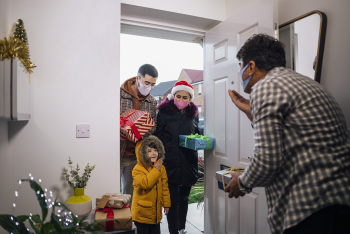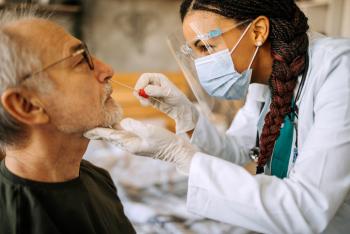Long COVID refers to a range of persistent symptoms that can linger for weeks, months or years after...
Read More
At Inspira, we are driven to fulfill our Inspira promise to every patient in every encounter —patient safety, clinical excellence and a Wow experience. Safety is the foundation of our promise, and at Inspira we put patients first and safety first while focusing on the relationship among patients and caregivers to create the trust patients need to also feel safe.
Five years ago we embraced as an organization the safety science and high reliability organizing (HRO) to both keep our patients and employees safe and to continuously improve our care processes to create and maintain a safe environment.
What is high reliability? Simply stated, what is supposed to happen happens 100% of the time; what is not supposed to happen does not happen 100% of the time.
Our high reliability education allows us to consistently provide safe care and adapt quickly to a new situation. I can’t emphasize enough how this education has added an extra level of defense as we fight this COVID-19 pandemic.
Every Monday morning, front-line staff receive DiAngelo’s Dailies via email. In this communication I share five days of messages focusing on one topic: patient safety. Our leaders then reinforce these messages during daily safety briefings and at each shift change in their daily department huddles.
But as we all know, it’s the practice of what we learned in the high reliability education that counts. At every level of the organization, no matter the title or expertise, we expect our staff to speak up for safety and peer-check each other. And in return, be willing to be “peer checked” - thanking the person for doing so.
I realize that the stress of this pandemic has the ability to cloud our thoughts and blur our actions. In using our high reliability, we bring clarity to every situation and we keep everyone safe. Practice communicating clearly, ask clarifying questions, repeat and read back, and use the SBAR (Situation, Background, Assessment, Recommendation) technique to facilitate prompt and appropriate communication. It is rare when you don’t hear, “I’d like to ask a clarifying question” during most discussions.
Two months ago - surge, social distancing and flattening the curve weren’t in our vocabulary. Now they dominate our days. Let me explain two new concepts that are now closely monitored by Inspira:
Cohort: The dictionary describes this noun as group of individuals having a statistical factor in common. Health organizations like Inspira now use the term “cohorting” to define how our hospitals have completely concentrated COVID-19 patients and non COVID-19 patients in different locations. These patients are also treated by distinct care teams.
Negative pressure rooms: This type of environmental control has been used in hospitals to help prevent the spread of airborne diseases, such as tuberculosis and the flu. Now it is a powerful tool to safely care for our patients with COVID-19.
Negative air is achieved by reducing the volume of supply air into the room and discharging a greater amount of “exhaust air” out of the room. This produces a negative pressure within the room.
One month ago - our network’s facilities team worked around-the-clock to convert the entire east patient tower at Inspira Medical Center Mullica Hill to create 92 negative pressure rooms. We also added dozens of negative pressure rooms at Inspira Vineland and Elmer, as well as the emergency departments in Mullica Hill, Vineland, Elmer and Bridgeton. These rooms allow us to isolate our COVID-19 patients from our other patients.
Commit to clean hands by washing your hands often with soap and water for at least 20 seconds. If soap and water are not readily available, use a hand sanitizer that contains at least 60% alcohol. Cover all surfaces of your hands and rub them together until they feel dry. Avoid touching your eyes, nose, and mouth with unwashed hands. Cover your mouth and nose with a cloth face cover when around others. Practice social distancing, keeping 6 feet between yourself and others. Remember - the cloth face cover is not a substitute for social distancing.
It’s too early to say for sure but we may be seeing a flattening of the curve. The number of South Jersey residents who are testing positive is decreasing—but we all have to stay vigilant.
Above all, if you are experiencing chest pains or other symptoms which may indicate a serious health issue, please call 9-1-1. We provide a safe environment for every patient who needs our care.
We continue to staff our COVID-19 Community Hotline, 1-800-772-2848, weekdays, 8 a.m. to 4:30 p.m. If our Inspira employee who answers the phone, doesn’t have the answer to your question, they will find out the answer and call you back. You can also email us at COVID19@ihn.org
Join us in expressing our gratitude and support to all of the caregivers and staff going above and beyond by risking their lives every day providing care safely to every patient, every time.
Place a blue heart in your window as a way to express your gratitude for health care workers on the front line. Be sure to take photos or videos of your blue hearts and share on your social platforms using the hashtag #BlueHeartsForHeroes to recognize the bravery of front-line staff.

Long COVID refers to a range of persistent symptoms that can linger for weeks, months or years after...
Read More
A Very COVID Christmas: How to Celebrate Safely
Read More
After more than two years of masks, social distancing and travel restrictions, this winter is likely...
Read More
The material set forth in this site in no way seeks to diagnose or treat illness or to serve as a substitute for professional medical care. Please speak with your health care provider if you have a health concern or if you are considering adopting any exercise program or dietary guidelines. For permission to reprint any portion of this website or to be removed from a notification list, please contact us at (856) 537-6772